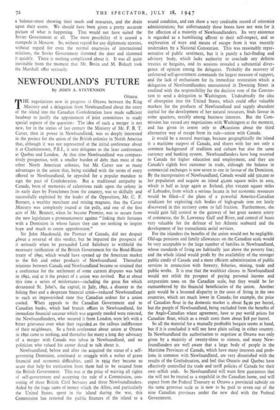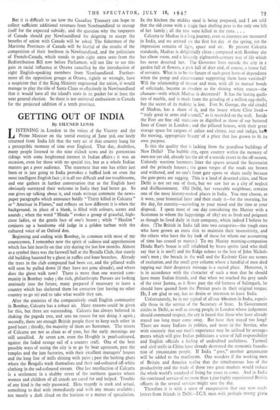NEWFOUNDLAND'S FUTURE
By JOHN A. STEVENSON Ottawa.
THE negotiations now in progress Et Ottawa between the King Ministry and a delegation from Newfoundland about the entry of the island into the Canadian Confederation have made sufficient headway to justify the appointment of joint committees to study special aspects of the question.. The idea of such a merger is not new, for in the sixties of last century the Ministry of Mr. F. B. T. Carter, then in power in Newfoundland, was so deeply interested in the project for the union of the British colonies in North America that, although it was not represented at the initial conference about it at Charlottetown, P.E.I., it sent delegates to the later conferences at Quebec and London. At that time Newfoundland was compara- tively prosperous, with a smaller burden of debt than most of the other North American colonies, but Mr. Carter saw so many advantages in the union that, being satisfied with the terms of entry offered to Newfoundland, he appealed for a popular mandate to sign the pact of Confederation. But a traditional antipathy to Canada, born of memories of calamitous raids upon the colony in its early days by Frenchmen from the country, was so skilfully and successfully exploited by the leader of the Opposition, Mr. C. F. Bennett, a wealthy merchant and mining magnate, that the Carter Ministry was completely routed at the polls, and one of the first acts of Mr. Bennett, when he became Premier, was to secure from the new legislature a pronouncement against " linking their fortunes with a Dominion in whose future they can see nothing to inspire hope and much to create apprehension."
Sir John Macdonald, the Premier of Canada, did not despair about a reversal of this verdict, but he impaired the prospects of it seriously when he persuaded Lord Salisbury to withhold the necessary ratification of the British Government for the Bond-Blaine treaty of 189o, which would have opened up the American market to the fish and other products of Newfoundland. Thereafter relations between Canada and Newfoundland became so strained that a conference for the settlement of some current disputes was held in 1892, and at it the project of a union was revived. But at about this time a series of misfortunes—including the great fire which devastated St. John's, the capital, in July, 1892, a disaster to the fishing fleet and a desperate financial crisis—reduced Newfoundland to such an impoverished state that Canadian ardour for a union cooled. When appeals to the Canadian Government and to Canadian banks, which had branch offices in Newfoundland, for immediate financial succour which was urgently needed were rejected, the Newfoundlanders, who secured it from London, were left with a bitter grievance over what they regarded as the callous indifference of their neighbours. So a fresh conference about union at Ottawa in 1892 came to nothing, and thereafter for many a long day advocacy of a merger with Canada was taboo in Newfoundland, and no politician who valued his career dared to talk about it.
Newfoundland, before and after she acquired the status of a self- governing Dominion, continued to struggle with a welter of grave financial and economic difficulties, until in 1934 they became so acute that help for extrication from them had to be secured from the British Government. This was at the price of waiving all rights of self-government and accepting the rule of a Commission, con- sisting of three British Civil Servants and three Newfoundlanders. Aided by the huge sums of money which the Allies, and particularly the United States, spent in the island during the war, this Commission has restored the public finances of the island to a sound condition, and can show a very creditable record of reformist administration; but unfortunately these boons have not won for it the affection of a majority of Newfoundlanders. Its very existence is regarded as a humiliating affront to their self-respect, and so exploration of ways and means of escape from it was recently undertaken by a National Convention. This was reasonably repre- sentative of public sentiment, but it is purely a fact-finding and advisory body, which lacks authority to conclude any definite treaties or bargains, and its sessions revealed a substantial diver- gence of opinion among the delegates. Probably the recovery of unfettered self-government commands the largest measure of support, and the lack of enthusiasm for its immediate restoration which a delegation of Newfoundlanders encountered in Downing Street is credited with the responsibility for the decisive vote of the Conven- tion to send a delegation to Washington. Undoubtedly the idea of absorption into the United States, which could offer valuable markets for the products of Newfoundland and supply abundant capital for the development of her natural resources, finds favour in some quarters, notably among business interests. But the Com- mission has vetoed any negotiations with Washington at the moment, and has given its assent only to dAcussions about the third alternative way of escape from its rule—union with Canada.
it would be a natural marriage, because geographically the island is a maritime outpost of Canada, and shares with her not only a common background 9f tradition and culture but also the same currency and banking system. Newfoundlanders have long resorted to Canada for higher education and employment, and they are Canada's eighth best customer in trade, although the balance in commercial exchanges is now seven to one in favour of the Dominion. By the incorporation of Newfoundland, Canada would add 320,000 to her population and acquire an island 43,000 square miles in area, which is half as large again as Ireland, plus ito,000 square miles of Labrador; from which a serious lacuna in her economic resources would be filled—if the plans of a powerful Americo-Canadian syndicate for exploiting rich bodies of high-grade iron ore lately discovered in this territory come to full fruition. Furthermore, she would gain full control to the gateway of her great eastern artery of commerce, the St. Lawrence Gulf and River, and control of bases very valuable for the defence of her Atlantic seaboard and the development of her transatlantic aerial services.
For the islanders the benefits of the union would not be negligible. Old-age pensions and family allowances on the Canadian scale would be very acceptable to the large number of families in Newfoundland, whose standards of living are habitually just above the poverty line; and the whole island would profit by the availability of the stronger public credit of Canada and a more efficient administration of public services in connection with forestry, fisheries, mining, trade and public works. It is true that the wealthier classes in Newfoundland would not relish the prospect of paying personal income and corporation taxes on the Canadian scale, but they would be far outnumbered by the financial beneficiaries of the union. Another gain would be a lessened disparity in the costs of living in the two countries, which are much lower in Canada; for example, the price of Canadian flour in the domestic market is about $4.90 per barrel, but the people of Newfoundland, being excluded from the benefits of the Anglo-Canadian wheat agreement, have to pay world prices for Canadian flour, which as a result costs them about $18 per barrel.
So all the material for a mutually profitable bargain seems at hand, but if it is concluded it will not have plain sailing in either country. In Newfoundland the authorisation to negotiate at Ottawa was only given by a majority of twenty-three to sixteen, and many New- foundlanders are well aware that a large body of people in the Maritime Provinces of Canada, which have many interests and prob- lems in common with Newfoundland, are very dissatisfied with the results of the Confederation, and feel that Ontario and Quebec have effectively controlled the trade and tariff policies of Canada for their own selfish ends. So Newfoundland will want firm guarantees that she will not be treated as a stepchild in the Canadian home, and will expect from the Federal Treasury at Ottawa a provincial subsidy on the same generous scale as is now to be paid to seven out of the nine Canadian provinces under the new deal with the Federal Government. But it is difficult to see how the Canadian Treasury can hope to collect sufficient additional revenues from Newfoundland to recoup itself for the expected subsidy, and the question why the taxpayers of Canada should pay Newfoundland for deigning to accept the benefits of union with Canada will be asked. The fishermen of the Maritime Provinces of Canada will be fearful of the results of the competition of their brethren in Newfoundland, and the politicians of French-Canada, which stands to gain eight extra seats from the Redistribution Bill now before Parliament, will not like to see this gain in racial influence at Ottawa cancelled by the introduction of eight English-speaking members from Newfoundland. Further- more all the opposition groups at Ottawa, rightly or wrongly, have a suspicion that if the King Ministry engineered the union, it would manage to play the role of Santa Claus so effectively in Newfoundland that it would have all the island's seats in its pocket for at least the next general election. So there is not universal enthusiasm in Canada for the projected addition of a tenth province.



































 Previous page
Previous page